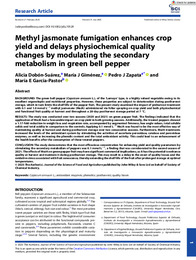Por favor, use este identificador para citar o enlazar este ítem:
https://hdl.handle.net/11000/38011Registro completo de metadatos
| Campo DC | Valor | Lengua/Idioma |
|---|---|---|
| dc.contributor.author | Dobón-Suárez, Alicia | - |
| dc.contributor.author | Giménez, María J. | - |
| dc.contributor.author | Zapata, Pedro J. | - |
| dc.contributor.author | García-Pastor, María E. | - |
| dc.contributor.other | Tecnología agroalimentaria | es_ES |
| dc.date.accessioned | 2025-11-10T12:06:58Z | - |
| dc.date.available | 2025-11-10T12:06:58Z | - |
| dc.date.created | 2025-01-21 | - |
| dc.identifier.citation | Journal of the Science of Food and Agriculture | es_ES |
| dc.identifier.issn | 1097-0010 | - |
| dc.identifier.issn | 0022-5142 | - |
| dc.identifier.uri | https://hdl.handle.net/11000/38011 | - |
| dc.description.abstract | BACKGROUND: The green bell pepper (Capsicum annuum L.), of the ‘Lamuyo’ type, is a highly valued vegetable owing to itsexcellent organoleptic and nutritional properties. However, these properties are subject to deterioration during postharveststorage, which in turn limits the shelf-life of the pepper fruit. The present study examined the impact of preharvest treatmentwith 0.1 and 1.0 mmol L−1 methyl jasmonate (MeJA) administered via foliar spraying on crop yield and both physiochemicaland functional fruit quality at harvest and throughout a 28-day postharvest storage period at 7 °C.RESULTS: The study was conducted over two seasons (2020 and 2021) on green pepper fruit. The findings indicated that theapplication of MeJA had a favourable impact on crop yield in both growing seasons. Additionally, the treated peppers showeda 1.17-fold reduction in weight loss and respiration rate, accompanied by augmented firmness, hue angle values, total solublesolids and total acidity in comparison to the controls. Applying 0.1 mmol L−1 MeJA was found to be the most effective way ofmaintaining quality at harvest and during postharvest storage over two consecutive seasons. Furthermore, MeJA treatmentsincreased the levels of the antioxidant system by stimulating the activities of ascorbate peroxidase, catalase and peroxidaseenzymes, as well as increasing the phenolic content and the total antioxidant activity. This could lead to an enhancement ofthe health benefits after the consumption of these treated peppers.CONCLUSION: The study demonstrates that the most efficacious concentration for enhancing yield and quality parameters bystimulating the secondary metabolism of peppers was 0.1 mmol L−1 , a finding that was corroborated in the second season of2021. The effects of MeJA on green pepper fruit may have significant commercial implications, as it has the potential to enhancequality at harvest and maintain it during postharvest storage. This may result in a delay in the onset of quality losses and theoxidative stress associated with fruit senescence, thereby extending the shelf-life of the fruit after prolonged storage at optimaltemperatures | es_ES |
| dc.format | application/pdf | es_ES |
| dc.format.extent | 18 | es_ES |
| dc.language.iso | eng | es_ES |
| dc.publisher | Wiley Online Library | es_ES |
| dc.rights | info:eu-repo/semantics/openAccess | es_ES |
| dc.rights.uri | http://creativecommons.org/licenses/by-nc-nd/4.0/ | * |
| dc.subject.other | CDU::6 - Ciencias aplicadas | es_ES |
| dc.title | Methyl jasmonate fumigation enhances cropyield and delays physiochemical quality changes by modulating the secondary metabolism in green bell pepper | es_ES |
| dc.type | info:eu-repo/semantics/article | es_ES |
| dc.relation.publisherversion | https://doi.org/10.1002/jsfa.70129 | es_ES |

Ver/Abrir:
J Sci Food Agric - 2025 - Dobón‐Suárez - Methyl jasmonate fumigation enhances crop yield and delays physiochemical quality.pdf
5,13 MB
Adobe PDF
Compartir:
 La licencia se describe como: Atribución-NonComercial-NoDerivada 4.0 Internacional.
La licencia se describe como: Atribución-NonComercial-NoDerivada 4.0 Internacional.
.png)